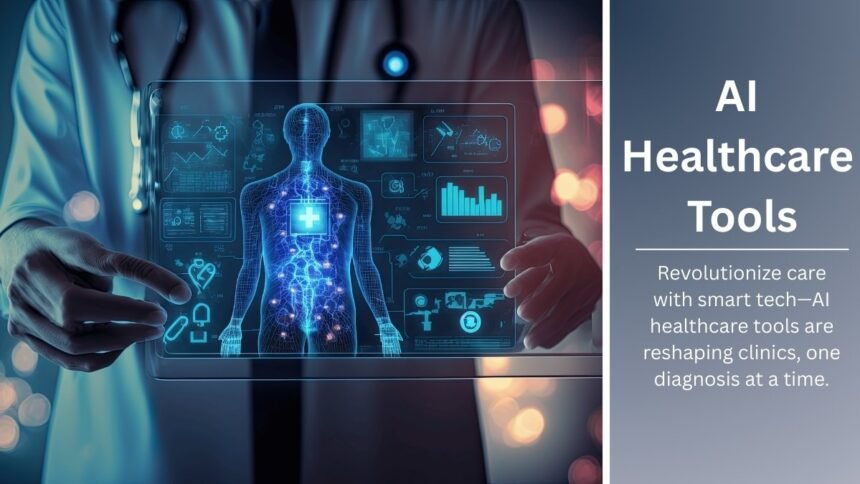AI Healthcare Tools : Revolutionizing Small Clinics in 2025In today’s rapidly advancing healthcare industry, Small clinic AI tools are turning to AI healthcare tools to improve patient care, streamline operations, and boost efficiency. From virtual consultations to data-driven diagnostics, AI-powered technology is making a significant impact on how healthcare providers interact with patients and manage their practices. In this blog, we’ll explore the top AI tools that small clinics can implement, their benefits, and how they’re shaping the future of healthcare.
READ MORE :-Top Insurance Apps 2025: Digital Policy Management, Claims, Health & Auto Tools Compared
Introduction: The Importance of AI in Healthcare
The healthcare landscape is evolving, and small clinics are no longer exempt from the need to integrate AI into their practices. AI in healthcare offers numerous advantages, including enhanced patient experiences, better clinical decision-making, improved operational efficiency, and reduced costs. But how can small clinics leverage AI tools to provide the best care while staying competitive in an ever-evolving market?
This guide will help you understand how AI healthcare tools are transforming small clinics and the practical steps you can take to integrate them into your clinic.
1. Streamlining Patient Care with AI
AI-Powered Virtual Assistants
Small clinics can utilize AI-powered virtual assistants to interact with patients, schedule appointments, send reminders, and even provide basic medical advice based on symptoms. These virtual assistants reduce the workload of medical staff and ensure that patients get timely responses to their queries.
Telemedicine Integration
AI enhances telemedicine by using intelligent chatbots to handle initial consultations. These systems collect patient data, identify symptoms, and recommend the next steps in treatment or further tests. Clinics can offer virtual care through telehealth tools integrated with AI for more personalized patient experiences.
2. Data-Driven Decision-Making: Enhancing Diagnostics and Treatment
AI for Diagnostics
AI tools such as image recognition software and diagnostic algorithms are transforming diagnostics by analyzing medical images like X-rays, CT scans, and MRIs with high accuracy. For small clinics, this means quicker and more accurate diagnoses without the need for expensive equipment or specialists.
Predictive Analytics in Healthcare
AI can analyze vast amounts of patient data to predict health conditions before they become severe. For small clinics, using predictive analytics tools can help them prioritize patient care, avoid medical errors, and manage chronic conditions more effectively.
3. Operational Efficiency with AI Tools
AI in Administrative Tasks
AI is revolutionizing administrative tasks in small clinics, from automating billing and insurance claims to streamlining appointment scheduling and follow-ups. Clinics can reduce their overhead costs while improving accuracy and patient satisfaction.
Inventory and Supply Chain Management
Small clinics can implement AI to automate inventory management, track medical supplies, and predict when items need to be replenished. This ensures that clinics never run out of essential supplies, reducing unnecessary downtime and costs.
4. Patient Engagement: AI in Personalized Healthcare
Personalized Health Plans
AI tools can analyze a patient’s health history, genetics, and lifestyle factors to create personalized health plans and wellness recommendations. Small clinics can offer customized care based on real-time data, ensuring patients receive the most effective treatment.
AI in Post-Care Monitoring
After treatment, AI tools can be used to monitor patient recovery. Wearables and health trackers integrated with AI can alert healthcare providers when a patient requires attention, ensuring timely interventions.=
5. Benefits of AI Healthcare Tools for Small Clinics
Cost Efficiency
AI tools can help small clinics reduce operational costs by automating routine tasks and improving workflow efficiency. This allows healthcare providers to focus on more critical tasks, ultimately improving the quality of care.
Improved Patient Outcomes
AI-powered tools can lead to better health outcomes by enabling quicker diagnoses, more accurate treatment plans, and personalized healthcare experiences.
Scalability
With AI, small clinics can easily scale their operations as their patient base grows. From virtual consultations to automated administrative tasks, AI makes it easier for clinics to handle increased patient volume without needing to hire additional staff.
6. Challenges of Implementing AI in Small Clinics
While AI in healthcare provides numerous benefits, small clinics may face challenges in its implementation, such as high initial costs, resistance to change from staff, and the need for training. However, with the right approach, these challenges can be overcome.
7. Future Trends: What’s Next for AI in Small Clinics
As AI continues to evolve, small clinics can expect even more advanced tools in the future. We’re likely to see improvements in patient monitoring, real-time diagnostics, and AI-based robotic surgeries. Small clinics that adopt these tools early will stay ahead of the curve and provide the best care possible.
Conclusion: Embracing AI in Healthcare
AI healthcare tools are not just for large hospitals and research institutions anymore. Small clinics can benefit immensely from these technologies, improving patient care, operational efficiency, and cost-effectiveness. By embracing AI, small clinics can deliver better healthcare while remaining competitive in an increasingly technology-driven world.
